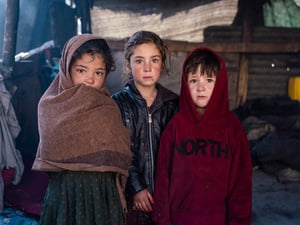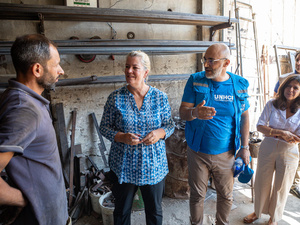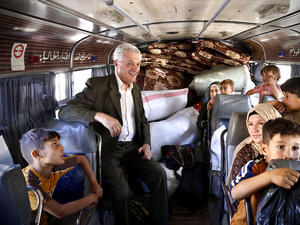Thousands of Iraqis seek refuge from Mosul fighting in war-torn Syria
Thousands of Iraqis seek refuge from Mosul fighting in war-torn Syria
The past month has seen a spike in numbers of Iraqi refugees risking the dangerous crossing into Syria in a desperate bid to escape ISIL-held Mosul, the pending battle to retake it, and fighting in surrounding areas.
Since the beginning of May, a total of 4,266 refugees have arrived at the Al-Hol camp located 14 kilometres from the Iraqi border in Syria's north-eastern Hasakah Governorate.
In anticipation of further arrivals in the coming weeks, the first of five UNHCR airlifts of emergency items such as tents and blankets arrived from Jordan to Qamishli in the far north of Hasakah Governorate on Thursday. The total amount of aid arriving will be enough to provide support for up to 50,000 people, including refugees and the immediate host community.
Many of the recently arrived refugees report having to engage smugglers to make the journey from Mosul, which typically takes between two days and a week travelling through extremist-controlled territory to reach the Kurdish-controlled areas of Hasakah. One family said it took them more than a month to reach Syria from Mosul.
Of the total arrivals, 968 have since made their way north to the Yaroubia border crossing in order to re-enter Iraq and find areas of safety that are only accessible by crossing into Syria. A further 223 have moved to Roj camp in the north of Hasakah to reunite with relatives or seek medical care, while a few others are being hosted by locals in several villages near the Iraqi border.
UNHCR, the UN Refugee Agency, working with local NGO partners, is distributing tents, mattresses and sleeping mats to the new arrivals, most of whom are without adequate shelter and sanitary facilities.
The agency is also coordinating efforts to ramp up medical assistance to those in need. Large numbers are suffering from skin diseases and other health problems following prolonged exposure to heat and dust on the journey, while treatment for chronic conditions such as diabetes and heart disease is also urgently required.
The relief effort is being complicated by the fact that Hasakah Governorate is inaccessible by land from inside Syria, while UN aid deliveries via the Nuseybin border crossing with Turkey have been suspended since the end of last year due to security concerns.
Hasakah Governorate is currently home to some 90,000 Syrians displaced by the country's long-running conflict, as well as more than 16,000 Iraqi refugees.
The area of Hasakah surrounding Al-Hol saw clashes between various armed groups during Syria's civil conflict until late 2014, when Kurdish YPG forces took control. Earlier this month, thousands of displaced Syrians from Al-Hol village were allowed to return home.
The Al-Hol camp was originally established in 2004 to host Iraqi and later Palestinian refugees fleeing the conflict in Iraq. It was closed in June 2010 when the last of the Palestinian refugees were resettled to Damascus, but reopened in February 2016 to accommodate the latest influx of Iraqi refugees.
Together with its partners, UNHCR is assessing Al-Hol and other hosting sites in the region for further upgrade and rehabilitation ahead of a possible fresh influx of refugees fleeing fighting for control of Mosul and surrounding areas.
Meanwhile in Iraq, people continue to flee ongoing fighting south-east of Mosul, mainly in the Makhmur district, to the recently established Debaga camp in Makhmur city in Erbil Governorate. Local authorities estimate that an additional 30,000 people could be displaced in the coming months. An eventual assault on Mosul could displace over 600,000 people.
For more information on this topic, please contact:
- In Geneva, Ariane Rummery, +41 79 200 7617, [email protected]







